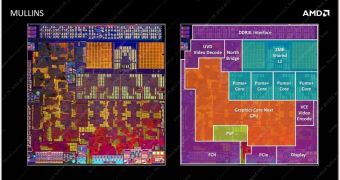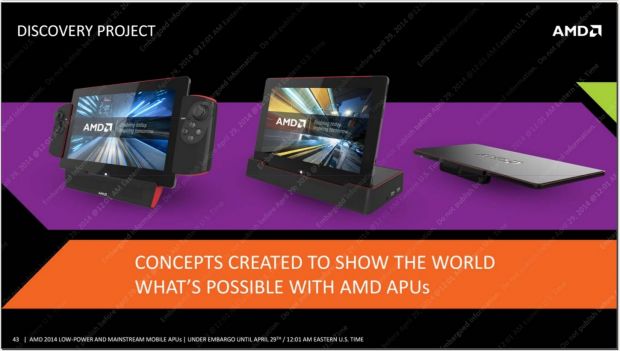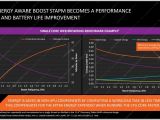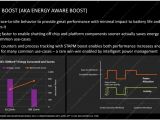We've already established that the Low-Power “Mullins” accelerated processing units from Advanced Micro Devices are very good at using little energy, and we have also seen that the mainstream “Beema” aren't half bad there either. It seems that AMD went a lot further than that though.
The Sunnyvale-based company did not only take into account power savings, even though extended battery lifespans and cost savings on energy would have been enough of an incentive all on their own.
No, the company also looked at the issue of comfort, so it somehow managed to sync, so to speak, its power saving techniques with the dynamic overclocking technology.
These two are really just sides of the same coin, since dynamic overclocking is a way to make sure that the chip (in this case SoC) is as non-wasteful as possible.
This brings us to the main order of business: the Intelligent Boost dynamic overclocking technology, a sort of analogue to Intel's Turbo Boost.
This technology not only checks to see if an app needs extra resources, but also if they will actually benefit from maxing the clock. Thus, only some apps will knock Intelligent Boost into moving.
A power management micro-controller tracks application behavior (in real time) to determine the “frequency sensitivity,” which is another way to say “it checks to see if the app is wasteful or not.”
The other thing that makes Intelligent Boost, well, intelligent, is the ability of devices (at least those based on the AMD Discovery Platform) to check skin temperature.
Long story short, Intelligent Boost checks to see how warm or hot your hands are and limits the period that the overclocking can go on for. Battery life should be prolonged due to the way power modes are cycled through.
It's clear that AMD envisions tablets, mobile gadgets and 2-in-1 products with integrated heat sensors, if nothing else.
In fact, Advanced Micro Devices included an illustration and very brief summary of its Discovery Project, which we touched upon in a previous article but included below for your convenience.
The docked tablet and slate with attachable game controls are things we have seen before, but AMD appears to be thinking of even a smartphone-sized mini PC. That one is an item whose range of uses and potential marketing success we're still not all that certain about.Then again, AMD is all about uncanny technology applications and efficient resource distribution. And the Beema/Mullins can certainly act as the primary foundation for some really awesome personal data assistants.

 14 DAY TRIAL //
14 DAY TRIAL // 







